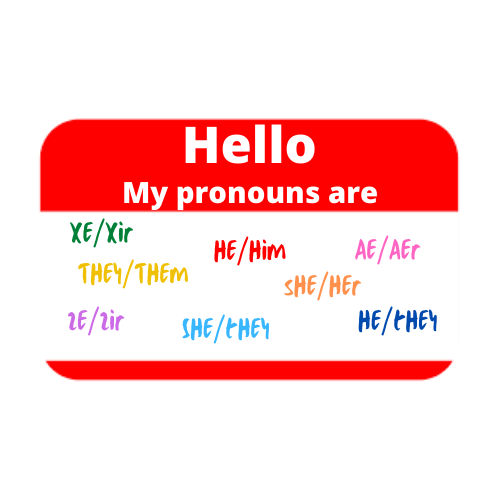The importance of pronouns

There are many different sets of pronouns that people can use, and it is important to respect all of them.
When I was thirteen years old, I learned that a close friend of mine preferred they/them pronouns. I was confused by what that meant, I had been taught that there were two genders: male and female. She/her and he/him. The friend explained to me that they did not feel female or male, just somewhere in the middle. It was new to me, and took awhile for me to accept, but I came to terms with the fact that gender is not black and white.
Earlier this month, when Elliot Page came out as transgender, my friends and I celebrated. Each person that shares their gender identity shines a light on all gender identities, and gives hope to those who are questioning their own or have found where they belong.
Unfortunately, many people still see the black and white version of gender. The close-minded or ignorant viewpoint can shove those who do not identify with their birth gender to the side, invalidating them. Gender is far from black and white. It is filled with colors, a spectrum of identities. It is important that everyone respects and understands this spectrum, regardless of your beliefs.
I sent an anonymous survey to a select group of students, asking them their thoughts on gender identity. The answers revealed a diverse community of genders, pronouns, and beliefs.
“No matter how you feel, using someone’s correct pronouns is not a matter of belief, it’s a matter of respect,” one student said. It is just like using a nickname or a different last name. Every gender is valid and deserves to be respected regardless of your beliefs. Those whose gender identity is different from their birth gender are often pushed aside by friends and family. Being accepting and loving of them often means the world to them.
Some students commented that their gender has not impacted their life in any significant way, while others said that theirs has changed theirs.
“It doesn’t define my life, I’m comfortable with it,” a student said. This is the case for a lot of people. Gender is something that is just there to most people. To others, it affects their life on a daily basis.
“It’s who you see in the mirror, it’s how other people see you, it affects how other people treat you. So even though it’s just in the back of my head most of the time, it’s always there,” one student commented. Gender means different things to different people, and it is important that everyone understands that.
Assuming gender identity is a problem in our culture. Deciding to use she/her or he/him pronouns just based on someone’s appearance is common and often unintentional. This is called misgendering, or referring to someone with pronouns that do not reflect their gender identity. It is often a knee-jerk reaction, if someone looks like a girl, people will use she/her pronouns. This is something that needs to change.
“I’ve been changing through they/them and she/they pronouns because I don’t mind she/her pronouns, but I don’t prefer them,” a student said. “When I went by they/them exclusively I would be called she/her a lot.”
If you go by a nickname, like I do, you prefer when people call you that name. When you meet someone new, and they call you by your full name, it feels weird or uncomfortable to hear that name. It is the same with pronouns. If someone uses they/them pronouns, and you assume that they use she/her or he/him, hearing that can make them feel uncomfortable, hurt, and invalidated.
Instead of assuming someone’s pronouns the next time you meet them, ask them their preferred pronouns! It is just as important as their name or age. If you forget to ask, or do not remember their pronouns, simply use they/them until you can confirm. If you mess up, and call them by the wrong pronouns, just apologize and correct your mistake.
Pronouns are not equal to gender. While certain pronouns are often associated with a certain gender identity, someone can still use those pronouns regardless of whether or not they are that gender. Some people use multiple pronoun sets, like she/they or he/they. Or they could use he/him and they/them. It is a matter of preference, and it is important to ask someone which they prefer.
Everyone, no matter their gender, deserves respect. Asking for pronouns and using them correctly is just one of the ways you can show love and acceptance towards others.
A quick guide on the use of pronouns:
She/her: She needed to go to the store. I gave the car keys to her. She drove her car to the store. She does not know why I had the keys, when the car is hers. She will ask me herself when she gets home.
He/him: He needed to go to the store. I gave the car keys to him. He drove his car to the store. He does not know why I had the keys, when the car is his. He will ask me himself when he gets home.
They/them: They needed to go to the store. I gave the car keys to them. They drove their car to the store. They do not know why I had the keys, when the car is theirs. They will ask me themself when they get home.
Further reading:
Your donation will support the student journalists of Fossil Ridge High School. Your contribution will allow us to purchase equipment and cover our annual website hosting costs.

Lizzy Camp is a senior and is elated to be entering her final semester as Editor in Chief, alongside Jordan Brownhill. She has spent four years working in the newsroom and has contributed many amazing articles, podcasts, and photos to Etched in Stone. She is excited to continue growing the Etched in...












